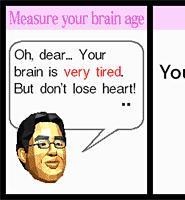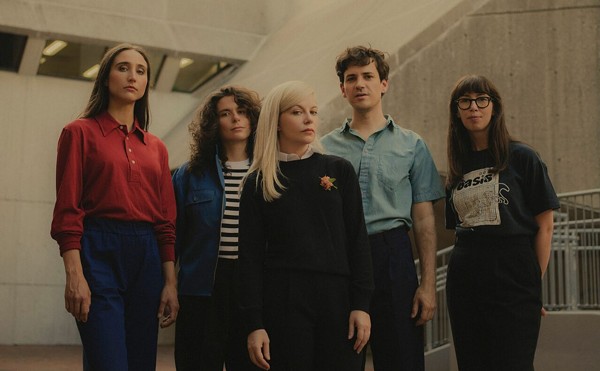So Nintendo's claim that its new portable offering, Brain Age: Train Your Brain in Minutes a Day!, actually makes players smarter has been received with a mix of curiosity, cynicism, and outright guffaws. What's next -- ice-cream sundaes fortified with the recommended daily allowance of vitamins?
Still, with ads for the game in Time magazine and on the Discovery Channel, it's clear that Nintendo is aiming squarely at adults, hoping that Brain Age will become as big a cultural phenomenon here as it is in Japan, where the "brain game" genre has reached Tamagotchi-like proportions.
Brain Age is the, ahem, brainchild of Dr. Ryuta Kawashima, a Japanese neuroscientist. Kawashima argues that simple intellectual exercises can improve memory and other brain functions. It's not totally far-fetched; research has demonstrated that Alzheimer's patients see improvement from doing crossword puzzles. Maybe all of us could benefit from mental calisthenics.
Brain Age begins by measuring your IQ -- or the game's version of it, anyway. Based on your speed and accuracy in solving a few simple puzzles, the game calculates your "brain age," with 20 being the best and 80 the worst. (Never mind that most 20-year-olds expend considerable mental energy just tapping the keg.)
After establishing your baseline, the game offers a path to improvement. The tasks include everything from solving a series of math problems to reading a passage from Robinson Crusoe into a microphone to looking at two clock faces and assessing how much time has passed. If it sounds like school, you're not far off. But who knew math could be so much fun?
Brain Age has a broad "pick-up-and-play" appeal. An entire session lasts no more than 5 or 10 minutes -- perfect for handheld gaming. And though the game's claim to make you smarter may smell a little dubious, even nongamers will be curious about where Brain Age will rank them mentally.
That's not to say that there aren't a few brain farts. While the game's voice and handwriting recognition isn't terrible, it's definitely Brain Age's biggest headache. The game has trouble recognizing the word "blue," which really mangles a task that involves verbally identifying colors. And when it comes to writing words, even the neatest grade-school penmanship frequently stumps the computer. It's one thing to feel stupid because you don't remember your times tables; it's another to be told you're senile because you write your G's funny.
Glitches aside, after a few weeks of play you'll see your brain age improve dramatically. Because the game tracks your performance -- graphs and charts show off your ever-increasing genius -- there's a real sense of progress. And upping your IQ feels like far more of an accomplishment than, say, rescuing Princess Peach or destroying Mother Brain.
But are you actually getting smarter -- or just better at playing the videogame? To put it another way: Just because you can frag your friends in Halo doesn't mean you're ready to fight in Iraq. And whatever improvements Brain Age offers could surely be gained from similar but more productive tasks -- like balancing your checkbook.
Marketing hype aside, in the end it doesn't really matter whether Brain Age makes you smarter. It's a lot of fun, and that's accomplishment enough for any videogame.












